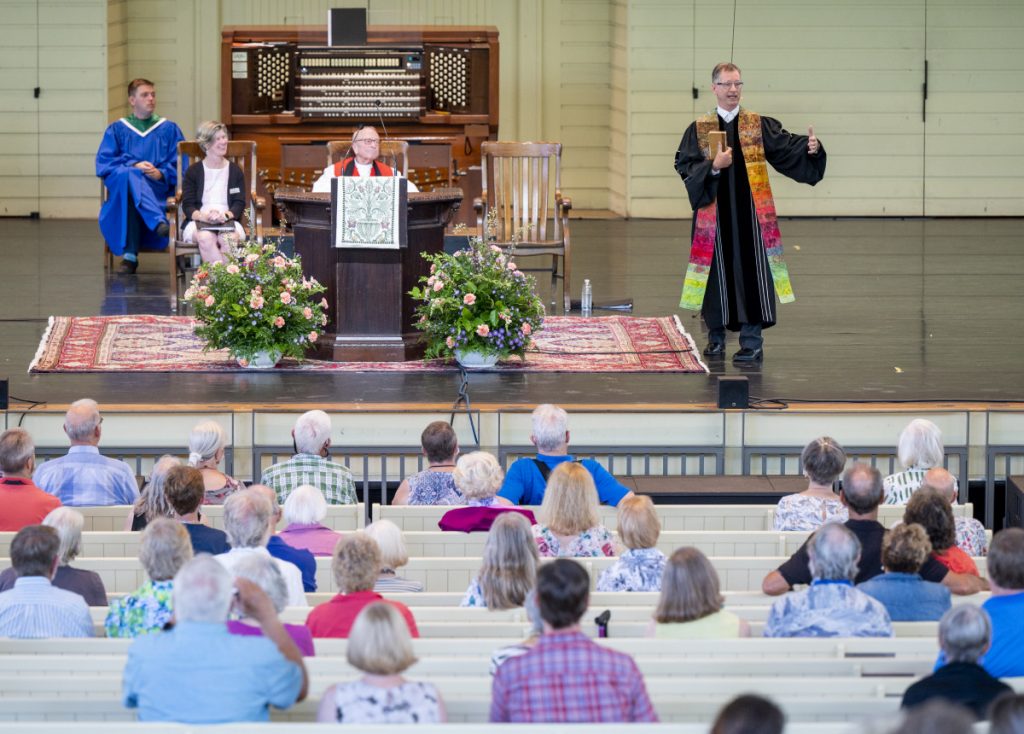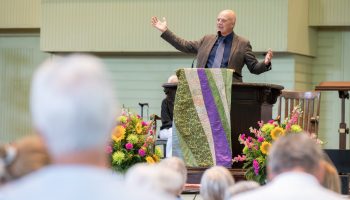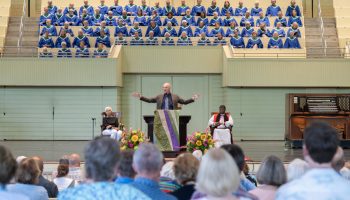MARY LEE TALBOT – STAFF WRITER

“I am a pacifist. Some crowds would not appreciate that statement and others would,” said the Rev. John C. Dorhauer. “Today that is irrelevant. This is a sermon about lifestyle and the choices that make peace possible.”
Dorhauer preached at the 9 a.m. Aug. 26 worship service in the Amphitheater. His sermon title was “Enough is Enough,” and the Scripture reading was Micah 4:1-4.
Dorhauer spent his sermon series looking at who God is; who Jesus, God incarnate is; who the Holy Spirit who emboldens is’ and how humans see discipleship in the light of the Trinity. Dorhauer looked at lifestyle in the context of the first verses of Micah 4 and how Micah differs from a similar passage in Isaiah 2:2-4.
“The Scripture is a dream, a hope, a vision of God’s. If God had wanted to make this happen, there is no doubt that God had the power,” Dorhauer said to the congregation. “But God depends on us to enact God’s vision, and we should feel some obligation to shape our lives so that God’s vision of Shalom is possible.”
In this vision, all nations would come to the mountain where the Lord’s house is established and see each other through God’s eyes.
“They would see the absurdity of taking up weapons and unlearn the ways of war and power over others,” Dorhauer said. “In Micah, the laying down of swords and beating them into plowshares and turning spears into pruning hooks is either a consequence of the vision or a prerequisite for the vision to happen.”
He continued, “What Isaiah does not have is the final verse in Micah 4:1-4. ‘They shall all sit under their own vines and under their own fig trees, and no one shall make them afraid.’ … To have our own vine and fig tree is how God intended us to live. If we can’t sit under our own fig tree, we will be at war. Why can’t we see that God created abundance.”
Dorhauer cited a Brookings study of the wealth gap. He said that 20% of the population of the United States had more wealth than the entire middle class; the top 1% had more wealth than the entire middle class. The United States has 4% of the world’s population and controls 30% of the resources in the world.
“How did we get to such a place?” he asked the congregation. “New Testament scholar Luke P. Johnson said, ‘Anything you possess that someone else needs belongs to them.’ Everyone sitting under their own vine and fig tree is God’s vision of how to live in the world without war. There is sufficiency for all, but the 1% need their sword and spear because it is the only way to preserve wealth. The United States has the largest military budget and the link between the military-industrial complex and the 1% is not a coincidence.”
In his first call out of seminary, Dohauer served a congregation that was dependent on agriculture. He had a church member, Sylvan Smoots, who had a bumper sticker on his truck which read, “Live simply so others can simply live.”
Dorhauer said, “There are 70 million refugees in the world who want food, water, a job and to sit unafraid under their own vine and fig tree. They cross many borders and get told, ‘You are not welcome here.’ The country of Jordan, one of the poorest in the world, with a population of 6 million, houses 2.5 million Syrian refugees. In 2020, the United States limit for refugees was set at 35,000. We have to struggle with this and the choices we have made in our lifestyle. To live simply is the pathway to God’s vision.”
Dorhauer said that 30 years ago the United States had 4% of the world’s population but controlled 40% of the resources; today it is 30%. “That is good news but now the middle class is struggling,” he said. “We don’t have time this morning to look at what a simple lifestyle might look like. We have to examine the decisions we would make.”
He continued, “God’s vision is enough. Only when everyone can sit under their own vine and fig tree unafraid will the vision be possible of no more war. It will be an honor to play in this world with God’s vision of Shalom.”
The Rev. David Shirey presided. Linda Bennett, a Chautauqua and Motet Choir member and a lay reader in her Episcopal church, read the Scripture. The Motet Consort played the first movement of Sonata No. 3 in D Major by Wolfgang Amadeus Mozart, arranged by Willie La Favor. The Consort featured Barbara Hois on flute, Debbie Grohman on clarinet, Willie La Favor and Joseph Musser on piano. Members of the Motet Choir sang “Ubi Caritas,” with music by Zachary Wadworth and words by Paulinus of Aquileia. The postlude, “Gigue Fugue” BWV 577, by Johann Sebastian Bach, was played by Joshua Stafford, Jared Jacobsen Chair for the Organist and director of sacred music. The Daney-Holden Chaplaincy fund provides support for this week’s services and chaplain.




